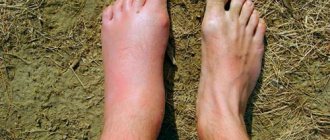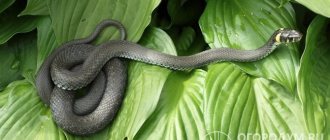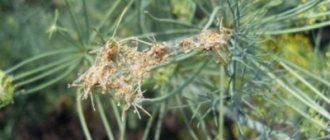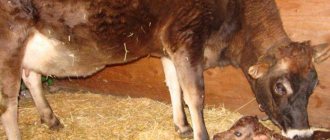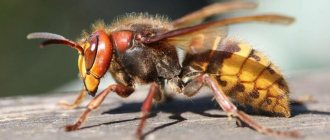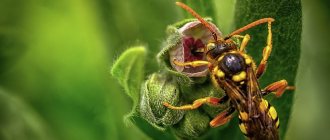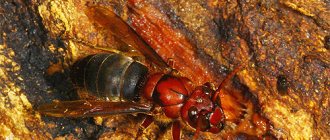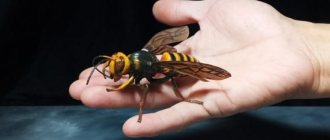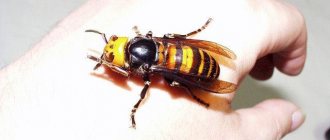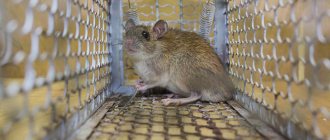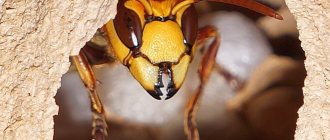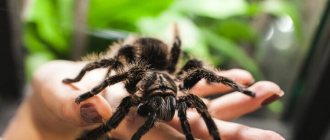Wasps can be a nuisance in the garden, and removing a wasp nest is a dangerous undertaking. They often settle in dachas, garden plots, fly into the house, onto the balcony, in search of food, looking for a place to create a nest. Wasps are very touchy and deftly sting. These insects can be dangerous, especially if they sting a person many times. We will tell you how to get rid of wasps in your country house, house, garden, balcony, and how to help a stung person.
Fighting wasps is a rather dangerous procedure; if it is carried out incorrectly, it can irritate insects and provoke them to attack. If a lot of these insects appear in the garden, you should not fight individual individuals; it is better to find the nest and destroy it. We need to watch them, they themselves will take us to the nest. Observations are carried out on clear days; it is necessary to determine where the working wasps fly from and where they return.
How to repel wasps on the site
If there is a wasp family or a nest in the garden, vegetable garden, garage, or dacha, you can get rid of it with smoke. The method will be much more effective if you set fire to certain “ingredients”.
- If you burn rubber, the unpleasant odor will be released for a very long time. In just one evening you can expel a wasp family from the nest forever. To consolidate the result, repeat the procedure the next day.
- In the yard, in the garden, in the vegetable garden, a fire is made from pine wood. Wasps cannot stand the smell of pine. For humans, this aroma is neutral; you can safely continue working on the site while the fire smokes the pests out of the nest.
- To scare away wasps from the table in the gazebo, on the terrace, on a picnic, they set fire to a spruce, pine, or wormwood twig.
A special spiral that, when burned, releases an insecticidal substance, repels wasps. The product is produced by different brands - Raptor, Clean House, Off, Moskitol. It burns completely in 2 hours, provides protection in the surrounding area for 5 m, and smokes insects out of the nest.
On a note!
Wasp colonies often appear near the pool. To get rid of them, use insecticides, pour boiling water over the nest, and use repellents. Dichlorvos, Super Fas, smoke bombs, and essential oils help against wasps near the pool.
The most effective means
By wisely using the “weaknesses and fears” of wasps and hornets, you can not only scare them away from the area, but also destroy the colony or reduce its population. For this purpose, various means are good, both store-bought and folk.
Purchased funds
Now in stores for gardeners there are a lot of different products, the purchase of which is guaranteed to get rid of annoying insects, including hornets and wasps. There is no point in considering them all; it is enough to note only those that will be most effective in scaring away wasps:
- Insecticides for wasps (aerosols Dichlorvos, Actellik, Combat, Troapsil, Reid, etc., as well as liquid products Karbofos, Executioner). The nest is sprayed with aerosols, and it is good if it can be done not only outside, but also inside, after which the entrance is sealed so that the wasps do not fly out of the nest. Liquid products are used to pour into the nest (if it is located, for example, in a hollow or in the ground).
- Sulphur dioxide. It is used to smoke the nest along with all the individuals inside until complete destruction. This is an effective remedy for hornets and wasps, but it is important to choose the time when the number of insects in the nest is maximum (late evening, night).
- Special traps. Commercial traps contain a liquid that is especially attractive to hornets and wasps, but absolutely uninteresting to bees. The principle of the traps is that the insect gets inside and cannot get out.
After “fumigating” or spraying the nest, you need to quickly retreat so as not to be attacked by insects. Further action can be safely left to the applied agent, the residual effect of which will complete the destruction process.
After the death of a wasp family, the nest must be destroyed (buried to a depth of 0.5 to 1 m or burned).
Controlling wasps and their nests indoors
Insects are attracted to the smell of sweet and sour. Pests flock to fruits, berries, lemonade, jam, honey. People enter the house through open doors and windows. To prevent pests from entering, folk remedies are used. Wipe window sills, frames with decoctions, solutions, or leave a cotton wool soaked in aromatic substances.
Fighting wasps using folk remedies
- Table vinegar. If you need to drive away wasps, wipe the window frame with a solution. Prepare at the rate of 1 teaspoon per 200 ml of cold water. To create a rich smell, soak a cotton swab with concentrated vinegar or pour it into a saucer.
- Ammonia. Insects are repelled by the smell of ammonia. Pests sense the persistent aroma several meters away and do not approach the house. To prepare the solution, pour 1 tbsp into 1 liter of water. a spoonful of alcohol. If you need to drive away a swarm that is trying to get into the house, leave soaked cotton wool on the windowsill. The main disadvantage is that the smell is unpleasant to humans; when inhaling concentrated vapors, headaches and dizziness appear.
- Essential oils will help against wasps and bees. The product is applied pointwise to window openings or left on a soaked cotton pad. The solution is used for spraying walls from the outside, as well as near nests. The aroma is pleasant to humans and can be sprayed in any room. Wasps do not like mint, lemon balm, lavender, basil, and geranium.
- Pyrethrum. Obtained from a certain type of chamomile. It is a natural insecticide. In insects it provokes muscle paralysis and causes death with prolonged exposure. The component is used in many repellents from the children's line. Sold in a pharmacy. An alternative option is chamomile.
On a note!
Bees and wasps find food using scent. If the former are looking for flower nectar, they enter the room by accident, the latter fly purposefully towards the smell of fruits, berries, juices, and jam.
Character traits
Wasps attack in swarms.
Wasps are quite unpleasant neighbors. Their disposition is not calm, even moreover, it is aggressive and intrusive. They attack people and animals many times their size. Moreover, I can attack in a pack.
For humans, their bites are painful and can cause an allergic reaction. On a site, a large number of wasps can harm vegetables and fruits; they love berries.
Wasp stings also pose a threat to domestic animals. Cats and dogs often suffer from bites. If there is an apiary on the site, bees are at risk, because wasps love honey and can attack honey plants.
Professional remedies for wasps and their nests in nature, near the house
The destruction of wasps in large concentrations is carried out using an insecticidal substance. Spray the outer walls of the premises and outbuildings. When using concentrated insecticides, protection lasts for 30 days. Effective remedies Get, Executioner, Tetrix, Tsifoks, Medilis Ziper. The drug against wasps in the form of a spray is valid for no more than 5 days. They use Dichlorvos, Karbofos, Clean House, Raptor, Raid.
Professional remedies for wasps
Repellents will help protect you from wasps in nature. The active substances are essential oils or broad-spectrum insecticides.
- Off. Aerosol against wasps and other flying insects. Used to treat open areas of the body, clothing, tents, bags. The action lasts for a maximum of 4 hours. The active substance is the insecticide N, N-diethyltoluamide -30%. The composition is complemented by fragrance and alcohol. The cost of the product is 200 rubles.
- Bros. Wasp spray based on an insecticidal substance. Shake the can well before use. Used to treat terrain, wasp nests. Effective at a distance of up to 5 m. Suitable if a swarm of wasps suddenly appears and you need to get rid of it. Sprayed into the air. Wasps and bees are extremely sensitive to the action of insecticides, so death occurs almost immediately. Price about 400 rubles.
- Preparations Dr. Klaus. A universal remedy for flies, wasps, hornets, mosquitoes and other parasites. The special design of the can allows you to attach a hose and spray on the area. Also used for spraying premises, outbuildings, tents, and nests. After disinfestation, the room only needs to be ventilated for 15 minutes. The price of the aerosol is 375 rubles. Dr. concentrate is also available for sale. Klaus. Price 1 liter 1000 rub.
- Garlic tincture. Repels wasps in the country house, in the farm yard. Fill the garlic heads with water, leave for a day, and use for wiping and spraying window sills, doorways, and walls.
Wasp repellents based on essential oils are prepared from:
- anise;
- mint;
- lemon balm;
- lemongrass;
- orange;
- basilica;
- garlic;
- bergamot;
- vanilla;
- geraniums;
- carnations;
- grapefruit;
- oregano;
- cedar;
- cinnamon;
- cardamom;
- lemongrass;
- lemon;
- juniper;
- graze;
- fir;
- rosemary;
- sandalwood;
- chamomile;
- pine trees;
- thyme;
- yarrow;
- thyme;
- citronella;
- eucalyptus;
- sage
Essential oils to combat wasps
Apply the product to clothing and exposed areas of the body. For wasps at a picnic, choose any scent from the above ingredients. It is allowed to combine several oils, creating a unique aromatic composition. It's very easy to prepare the spray. Use medical alcohol. Add essential oil and pour into a spray bottle. It is convenient to take the product with you into nature.
On a note!
Plants planted on the site will help avoid the wasp family from settling in and forming nests. They will drive away pests throughout the warm season. To repel, plants that can smell for a long time are used. Mint, lemon balm, chamomile, parsley, basil, garlic, lemongrass are suitable.
What scares you away
In order to prevent these “aggressors” from wanting to settle on the site, it is useful to know what will definitely push them away. Again, these could be odors that repel wasps or special devices.
Some aromas that are pleasant to people, but not tolerated by wasps, can affect insects in such a way that they may even leave their inhabited nest. What smell do wasps dislike?
- soap (a piece attached, for example, to an old feeder, will destroy the desire of wasps to build a nest there);
- smoke (to “smoke out” insects, you can use liquid smoke, smoke bombs, or burn spruce and pine cones on a fire);
- plants: mint, basil, geranium, lemon balm, wormwood (any such plant repels wasps so much that these insects will definitely not settle close to them, so it is advisable to plant them directly on the site);
- red pepper pods (hanged in bunches around the nest, after which the wasps can fly away from their “home forever);
- insecticidal aerosols (after spraying them, most of the individuals in the nest will die, and those accidentally saved will not return to the poisoned house).
Smells that attract wasps
Sometimes getting rid of wasps requires eliminating the scents that attract them. Traditional insect dishes - ripe fruits: apples, pears, apricots, melon, grapes, watermelon - should not be left openly available in the house.
Also attracts wasps:
- lemonade;
- kvass;
- Braga;
- yeast starter;
- syrup;
- sugar;
- jam;
- juice;
- beer;
- honey;
- spoiled meat, fish.
The smell is stronger from rotting, fermented foods. Therefore, they need to be disposed of in a timely manner so as not to attract pests. Insects provide protein food to the larvae. Therefore, along with sweets, they hunt for meat.
If you cannot scare away pests, prepare a simple trap from a plastic bottle. Cut off the neck, turn it inside like a watering can, and secure it with staples. Any bait is placed inside. Over the course of a day, several dozen individuals gather in one trap. Wasps fly in easily, but only a few get back out. It should also be remembered that it is permissible to destroy insects if they threaten health.
What attracts
It is known that the hornet is also, in fact, a wasp, and they are not only sweet-toothed, but also carnivorous insects. These weaknesses of theirs can be successfully used against themselves, giving them a final feast, while using anti-wasp remedies such as traps and bait. The food preferences of insects are very diverse:
- sweets (jam, honey, fruit, sugar water, etc.);
- fermented (beer, kvass, fermented jam and juices);
- food mixtures (beer + honey, beer + sugar, syrups from several ingredients, etc.);
- meat, fish (especially spoiled ones).
These are some of the favorite delicacies of wasps, smelling which insects will certainly flock to the place of feasting, not knowing that this may be their last meal. Thus, the fight against these insects on the site can take place according to the principle of special luring by using preferences, and all this with the goal of destroying or reducing the number of dangerous “neighbors”.
However, besides food, there are other smells that will definitely attract wasps and hornets: the smell of a sweaty body, sweet or floral perfume. In addition to odors, the aggression of wasps and hornets can increase from any bright (yellow, orange, etc.) and black color. Knowing this, you can reduce the likelihood of attracting insects to yourself.
Prevention of hornets
To prevent the appearance of a whole swarm of hornets in the yard, it is recommended to destroy their females in early spring or late autumn, when they are alone. You also need to seal all holes and cracks to prevent insects from entering the room. For prevention, you can install several traps around the garden or yard.
In places where the nest was previously destroyed, it is advisable to hang reflectors or mirrors to eliminate the possibility of insects returning. You can also buy a dummy nest. It will scare away the hornets, showing that the territory is already occupied.
Getting rid of single insects
What to do if a dangerous insect flies into your room or apartment? What are the hornets afraid of in this case? You can use one of the chemicals, for example, Dichlorvos, which is recommended to treat the room, closing all windows and doors. To destroy a single individual, you can use a vacuum cleaner. In this case, the insect will not have time to release special pheromones that call other insects to help. Some experts recommend using a trap made of a glass jar and sweets. When the hornet gets inside, the jar is covered with a lid.
